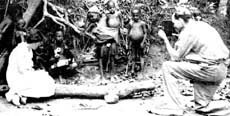The peculiar quality of Gregory Bateson's mind in the way in which he distills ideas from interaction with other people, which they in turn can distill again, is hard to describe. It is closely related to the ideas themselves, for his most exciting ideas, schismogenesis, the double-bind, and the relationship of purposeful human behavior to linear systems have all been about relationships between individuals or groups of individuals, elaborated and stylized by experience or culture. [Brockman 1977:171]
Bateson collaborated in this way not only with Mead, but also with John von Neumann, Warren McCullock, Claude Shannon, Norbert Weiner, and others in the development of cybernetic theory; with Jurgen Ruesch on psychosocial communication theory; with Don Jackson, Jay Haley, and John Weakland and others on theories of schizophrenia and family pathology; and with a large network of colleagues in the social sciences, psychiatry, ethology, ecology, evolutionary theory, and family therapy on the cluster of interrelated problems he addressed in the course of his life's work. Such intense collaboration makes it difficult to evaluate fully Bateson's individual contribution to the groups, and to the various sets of problems he addressed. He would, in large part, have assessed the question of his "individual contribution" as itself an error of some sort, since it claims that it is a member of the group, not the group itself, which is doing the important thinking. (The proceedings of one of these groups, a Wenner-Gren conference on "The Effects of Conscious Purpose on Human Adaptation," is reported in illuminating detail in Mary Catherine Bateson'sOur Own Metaphor[1972]). But those who have collaborated with him can attest that his contributions were central and seminal.
Bateson was fond of saying, in one of his analogies from one kind of system to another, that the mind is an ecological system and that introduced ideas, like introduced seeds, can only take root and flourish according to the nature of the system receiving them. He repeated his messages innumerable times to innumerable audiences, the redundancy being, he felt, necessary if what he had to say was to be truly heard. But he abhorred competitive struggle in the introduction of ideas, believing that it inevitably resulted in complicated forms of resistance and distortion.
Bateson and Mead 1936-1939

The points made are wise and, to me, generally unexceptionable. That they're thrown out by Bateson without being rooted in the philosophical and epistemological debate that has raged around them for the past decade may be seen either as the irritating intellectual sloppiness of an autodidact or as the grandeur of a profound mind summarizing a lifetime of experience.
The bookish reviewer is irritated, and leans to the first choice.
Batesonbelongedtonoacademicdiscipline.Inhisformationandcareerhewasan"original,"an"autodidact."Hisknowledgeandsenseofproblemwereformedinanexceedinglyrichearlyintellectualmilieu,byhislifelonginformalintellectualnetwork(whichincludedagoodsampleofthecentury'sbetterthinkers),byageniusforcloseobservationofwhatfascinatedhim(essentiallyth


 正在提交中...
正在提交中...



